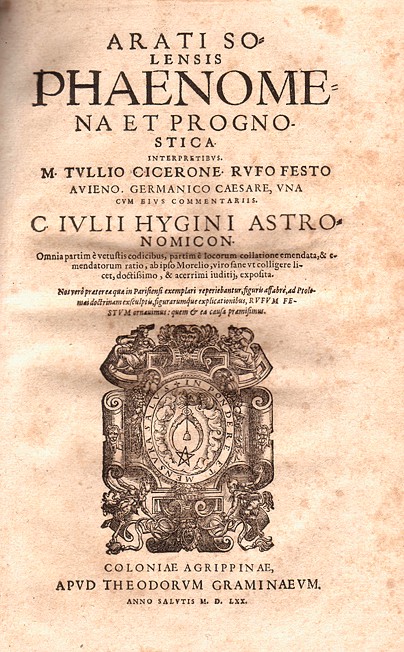Lessico
Festo
Avieno
Rufus Festus Avienus
Poeta
didascalico latino nato a Bolsena nel sec. IV dC da illustre famiglia. Tradusse il poemetto Fenomeni di Arato![]() ;
descrisse la Terra nel poemetto in esametri Descriptio orbis terrae,
rifacimento della Periegesis dell'alessandrino Dionisio e le coste dei
mari dell'impero dalla Britannia al Mar Nero in Ora maritima, in
senari giambici, di cui ci è giunta solo una parte del I libro.
;
descrisse la Terra nel poemetto in esametri Descriptio orbis terrae,
rifacimento della Periegesis dell'alessandrino Dionisio e le coste dei
mari dell'impero dalla Britannia al Mar Nero in Ora maritima, in
senari giambici, di cui ci è giunta solo una parte del I libro.

Postumius Rufius Festus Avienus
Postumius
Rufius Festus Avienus fuit poeta Romanus saeculi quarti qui floruit circa
annum 360 coaequalis imperatoris Iuliani Apostatae![]() . Eius
vitam ample describit Soubiran in parte editionis carminum Arateorum, quae
dicitur "introduction" (p. 7 sqq.); quo loco testimonia vitae (e.g.,
inscriptio Africae septentrionalis Bullae Regiae) disseruntur. Fortasse
Avienus paene culmen cursus honorum adeptus est (cf. Soubiran, p. 15 sqq.).
. Eius
vitam ample describit Soubiran in parte editionis carminum Arateorum, quae
dicitur "introduction" (p. 7 sqq.); quo loco testimonia vitae (e.g.,
inscriptio Africae septentrionalis Bullae Regiae) disseruntur. Fortasse
Avienus paene culmen cursus honorum adeptus est (cf. Soubiran, p. 15 sqq.).
De nomine
vero Avieni "adhuc sub iudice lis est" (utrum Avienus an Avienius
appellatus sit, incertum). Interdiu false habitus est pro fabularum poeta
Aviano.
Avieni opera nobis tradita sunt carmina Aratea, descriptio orbis terrae
secundum verba Dionysi Periegetae, ora maritima, sed et innotuit nobis
fragmentum de cometis in commentariis Servii ad Vergilium traditum. Textuum
traditio autem funesta paene dici potest, cum nonnisi editio princeps anni
1488, quam duo tantum codices praecedunt partem magnam vel totum opus
continentes (Soubiran, p. 75 sqq.); quibusdam locis textus emendari potest
secundum codices carminum Arateorum Germanici Caesaris.
Avienus ipse nequaquam Christianis annumerari potest, sed morem maiorum secutus est. In carminibus suis, Arateis philosophorum theologorumque opiniones commiscuit (quod nos hodie syncretismum dicere solemus): unus deus (quam opinionem religiosam henotheismum vocant) quasi numen rerum naturam penetrans dirigit atque gubernat variis sub speciebus, ut ita dicam. Gnosis vero praecellens elementum est poematum eius, quod Weber disserere conata est.
Avienus was a Latin writer of the 4th century. His full name Postumius Rufius Festus (qui et) Avien(i)us is mentioned on an inscription from Bulla Regia, but "Avienus" has become the usual form of reference.
He was a native of Volsinii in Etruria, a highly educated man from the distinguished family of the Rufii Festi. He was twice appointed consul (if an inscription published by the 17th-century antiquaries Jacob Spon and Raffaello Fabretti really refers to him).
Famously asked what he did in the country, in a poem (erroneously attributed to him) he answered Prandeo, poto, cano, ludo, lavo, caeno, quiesco ("I dine, drink, sing, play, bathe, sup, rest" in Richard Lovelace's translation). There is no hint of Christianity in his written work. In fact, there is a lack of any religious undertones in his work, indicating that he may have been Agnostic.
He made somewhat inexact translations into Latin of Aratus' didactic poem Phaenomena. Avienus also took a popular Greek poem in hexameters, Periegesis, briefly delimiting the habitable world from the perspective of Alexandria, written by Dionysius Periegetes in a terse and elegant style that was easy to memorize for Roman students, and translated it into an archaising Latin, as descriptio orbis terrae . Only Book I survives, with an unsteady grasp of actual geography and some far-fetched etymologies: see Ophiussa.
He also wrote Ora maritima ("sea coasts"), based on material adapted from the type of mariners' coasting directions called a Periplus and rendered as poetry, resulting in a confused amateur's account of the coastal regions of the Mediterranean. His editor A. Berthelot demonstrated that Avienus' land-measurements were derived from Roman itineraries but inverted some sequences. Berthelot remarked of some names on the Hispanic coast "The omission of Emporium, contrasting strangely with the names of Tarragon and Barcelona, may characterize the method of Avienus, who searches archaic documents and mingles his searches of them with his impressions as an official of the fourth century A.D." (Barthelmy, Introduction). Ora maritima was a work for the reader rather than the traveller, where the fourth century present intrudes largely in the mention of cities now abandoned. This Avienus is surely not identical with the Rufus (?) Festus who wrote, ca. 369, an epitome of Roman history in the genre called breviarium:
The scholar Theodore Mommsen identified that author with Rufius Festus, proconsul of Achaea in 366, and both with Rufus Festus Avienus. Others take him to be Festus of Tridentum, magister memoriae (secretary) to Valens and notoriously severe proconsul of the province of Asia, where he was sent to punish those implicated in the conspiracy of Theodorus. The work itself (Breviarium rerum gestarum populi Romani) is divided into two parts, one geographical, the other historical. For further information see Alan Cameron, "Macrobius, Avienus, and Avianus" The Classical QuarterlyNew Series, 17.2 (November 1967), pp 385-399.